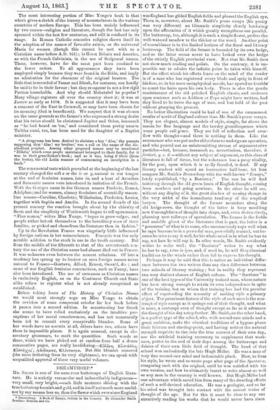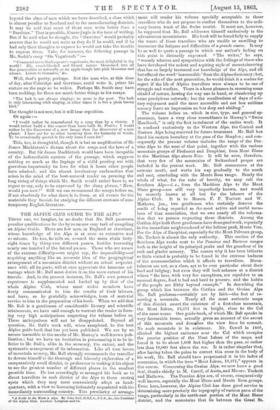DREAMTHORP.* Mn. SMITH is one of the numerous buttercups of
English litera- ture. He is strictly vernacular and indescribably indigenous— very small, very bright,—each little sentence shining with the truebuttercup burnish and gold, and in itself not much more useful, nor by any means less so, than the flower which ever since England
• Dreamthorp. A Book of Essays, written in the Country. By Alexander Smith London; Strahan and Co.
wasEngland has gilded English fields and pleased the English eye. There is, moreover, about Mr. Smith's prose essays (his poetry was very different) an idiomatic simplicity closely bordering upon the affectation of it which greatly strengthens our parallel. The buttercup, too, although it is such a simple flower, prefers the well-watered meadow to the thicket or the wool. Another point of resemblance is in the limited horizon of the floral and literary buttercup. The field of the former is bounded by its own hedge, and so the latter seems never to have looked over the hedge of the strictly English provincial view. Not that Mr. Smith does not show much reading and polish. On the contrary, it is im- possible not to admire the infinite pains he takes with himself.
But the effect which his efforts leave on the mind of the reader is of a man who has registered every blade and sprig in front of his door, or, in his more metaphysical moods, has spared no trouble' to count the hairs upon his own body. There is also the gentle reminiscence of the old polished English classic, and sentence upon sentence such as Addison or Pope might have written, had they lived to be twice the age of man, and lost hold of the past without grasping the present.
No better illustration could be had of one of the commonest results of north of England culture than Mr. Smith's prose essays.
They are elegant, almost models of style, simple, far above the mania for fine language and the tawdry grandiloquence which
some people call grace. They are full of reflection and over- flow with thought—and there is nothing in them. Like the astronomer who was put under chloroform to undergo an operation, and who poured out an unintermitting stream of argumentative particles—but, because, inasmuch as, nevertheless, therefore, a fortiori, q. e. d.—witbout any subject of argument, so this class of literature is full of forms, but the substance has a puny vitality, for the past, upon which it is redly founded, is dead. If any literary student will spend an instructive half-hour, let him compare Mr. Smith's Dreamthorp with the well-known "Essays," lately republished, "by a Barrister." The one he will find tottering through the old green lanes of English thought, coming from nowhere and going nowhere. In the other he will see, without any display of it, the great shadow- of coming change in the very midst of the iconoclastic tendency of the sceptical lawyer. The thought of the former meanders along the old hedge-rows, the thought of the latter is busy moulding new thoroughfares of thought into shape, and, even destructively, planning new railways of speculation. The former is the feeble and amiable ghost of the literature that is past, the latter is a "precursor" of what is to come, who unconsciously says well what he says because lie is a powerful mau, powerfully trained, not be- cause he tries to say it well, for his whole mind is in what he has to say, not how he will say it. In other words, Mr. Smith evidently writes to write well ; the "Barrister" writes to say what he has to say, toles in ipso, and, if need be, he will fling classical traditions to the winds rather than fail to express his thought.
Perhaps it may be said that this is rather an individual differ- ence between the two writers than any class difference between two schools of literary training ; but in reality they represent two very distinct classes of English culture. The " Barrister" is one of the best types of the University trained man, whose nature has been strong enough to retain its own independence in spite of the training, but on whom that training has had the peculiar effect of superseding the necessity of making style a primary object. The prominent feature of the style of such men is the con- tempt of style except as it springs out of their thought, and what is more, a contempt even of thought except so far as it advances the thought of the day astep further. Mr. Smith, on the other hand, is a perfect type of the school, who, with second-rate minds and a great ambition, make the classical traditions of a bygone phase their fulcrum and starting-point, and having neither the natural strength requisite to rise into the true current of their own day, nor the artificial training necessary to supplement that weak- ness, potter to the end of their days among the buttercups and daisies of their own little field of thought. The head of that school was undoubtedly the late Hugh Miller. He was a man of very fine second-rate mind and indomitable pluck. How, to form his style, he wrote and re-wrote page after page of the Spectator, comparing each with the original, until he was satisfied with his own version, and how he ultimately learnt to write almost as well as any man in the country is well known. But Hugh Miller had one advantage which saved him from many of the dwarfing effects of such a self-devised education. He was a geologist, and so far his mind was brought into contact with the newest trains of thought of the age. But for this it must be clear to any one attentively reading his works that he would never have risen
beyond the class of men which we have described, a class which is almost peculiar to Scotland and to the manufacturing districts. It may be said that some of these men write better than a "Barrister." That is possible, if mere jingle is the tune of writing. But if he said what he thought, the "Barrister" would probably answer that he would not write as they do if he could, and if be had only their thoughts to express he would not take the trouble to express them. Take, for instance, the following passage in Mr. Smith's essay "On Vagabonds " :—
" Commend me to Shakespeare's vagabonds, the most delightful in the world ! His sweet-blooded and liberal nature blossomed into all fine generosities as naturally as an apple-bough into pink blossoms and odours. Listen to Gonsalvo," &c.
Well, that's pretty, perhaps. But the man who, at this time of day, after Coleridge and Gervinns, could write it, prints his stature on the page as he writes. Perhaps Mr. Smith may have been nodding, for there are much better things in his essays.
"The lark is not always singing ; no more is the poet. The lark is only interesting while singing, at other times it is but a plain brown bird."
The thought is not new, but it will bear repetition. Or again :—
"I would rather be remembered by a song than by a victory. I would rather build a fine sonnet than have built St. Paul's ; I would rather be the discoverer of a new image than the discoverer of a new planet. I have ear for no other harmony than the harmony of words. To be occasionally quoted is the only fame I care for."
This, too, is thoughtful, though it is but an amplification of Sir James Mackintosh's dictum about the songs and the laws of a country. But Sir James Mackintosh would have been incapable of the indescribable egotism of the passage, which suggests nothing so much as the lispings of a child pouring out with garrulous importunity its love for what it hears other people have admired ; and the almost involuntary exclamation that arises in the mind of the best-natured reader on perusing the long string of things which Mr. Smith would rather have is, we regret to say, only to be expressed by the slang phrase, "Now, would you now ?" Still we can recommend the essays before us, if not absolutely for what there is in them, at all events for the materials they furnish for studying the different currents of con- temporary English literature.































 Previous page
Previous page